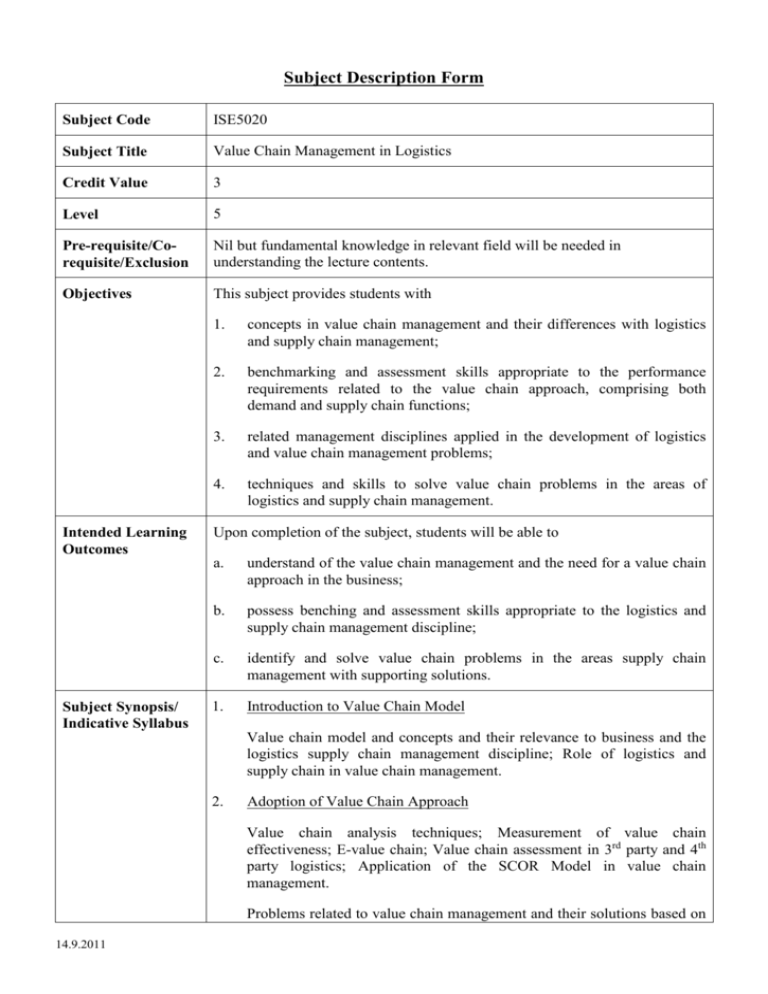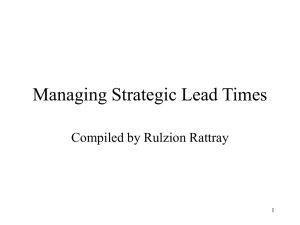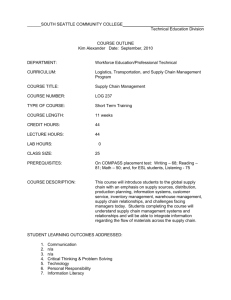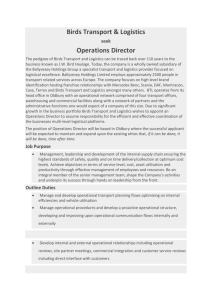(ISE5020) Value Chain Management in Logistics
advertisement

Subject Description Form Subject Code ISE5020 Subject Title Value Chain Management in Logistics Credit Value 3 Level 5 Pre-requisite/Corequisite/Exclusion Nil but fundamental knowledge in relevant field will be needed in understanding the lecture contents. Objectives This subject provides students with Intended Learning Outcomes Subject Synopsis/ Indicative Syllabus 1. concepts in value chain management and their differences with logistics and supply chain management; 2. benchmarking and assessment skills appropriate to the performance requirements related to the value chain approach, comprising both demand and supply chain functions; 3. related management disciplines applied in the development of logistics and value chain management problems; 4. techniques and skills to solve value chain problems in the areas of logistics and supply chain management. Upon completion of the subject, students will be able to a. understand of the value chain management and the need for a value chain approach in the business; b. possess benching and assessment skills appropriate to the logistics and supply chain management discipline; c. identify and solve value chain problems in the areas supply chain management with supporting solutions. 1. Introduction to Value Chain Model Value chain model and concepts and their relevance to business and the logistics supply chain management discipline; Role of logistics and supply chain in value chain management. 2. Adoption of Value Chain Approach Value chain analysis techniques; Measurement of value chain effectiveness; E-value chain; Value chain assessment in 3rd party and 4th party logistics; Application of the SCOR Model in value chain management. Problems related to value chain management and their solutions based on 14.9.2011 logical argument approach. Case examples of value chain logistics and managerial approach to solving problems in various logistics and business sectors. Teaching/Learning Methodology A mixture of lectures, tutorial exercises, case studies, and assignments are used to introduce the concepts that accompany the “New Economy Business Model.” Lectures are the primary vehicle to deliver the concept of value chain management. Case studies are used to explore the central role of the customer in formulating product-service strategies through the medium of the demand chain. Students are guided to illustrate their ability to integrate theory and practices, as well as their ability to work as a team. Teaching/Learning Methodologies Assessment Methods in Alignment with Intended Learning Outcomes Lecture Tutorial Seminars Project/case studies Intended Subject Learning Outcomes to be assessed a b c Specific assessment methods/tasks % weighting 1. Test 30% 2. Essay 30% 3. Assignment 40% Total 100% Intended subject learning outcomes to be assessed a b c Assignments are set to help students enforce the knowledge learned in the classes. Tutorial and laboratory work are designed to enable students practice their knowledge close to a realistic condition. Test is used to differentiate the performance of students in this subject. Student Study Effort Expected Class contact: Lectures/Seminars Tutorial/Case studies 30 Hrs. 9 Hrs. Other student study effort: 14.9.2011 Assignment 30 Hrs. Self study/Preparation work Total student study effort Reading List and References 37 Hrs. 106 Hrs. 1. Walters, D and Rainbird, M. 2007, Strategic Operations Management: A Value Chain Approach, Palgrave, Basingstoke, UK 2. Walters, D. 2004, New Economy – New Business Models – New Approaches, International Journal of Physical Distribution & Logistics Management, Vol. 34, Issues 3-4, pp. 219-229 3. Walters, D and Rainbird, M. 2007, Cooperative Innovation: A Value Chain Approach, Journal of Enterprise Information Management, Vol. 20, Issue 5, pp. 595-607 14.9.2011








